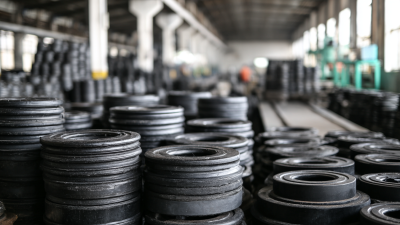Get a custom solution for free
-
Phone
-
E-mail
-
Whatsapp
-
Wechat


In the rapidly evolving landscape of manufacturing, bespoke rubber moulding has emerged as a critical component in designing and producing customized solutions for diverse applications. According to recent industry reports, the global market for custom rubber products is projected to reach $17.6 billion by 2026, driven by increased demand for tailored solutions across sectors such as automotive, medical, and consumer goods. Bespoke rubber moulding not only enhances the performance and durability of products but also allows for greater flexibility in design, catering to the specific needs of clients.

As businesses strive for innovation and competitive edge, understanding the top strategies for implementing bespoke rubber moulding becomes essential in navigating the complexities of custom applications and delivering high-quality results.
 Bespoke rubber moulding offers a unique combination of customization, functionality, and versatility, making it an ideal solution for various applications across different industries. One of the key features of bespoke moulding is its ability to cater to specific customer requirements, allowing manufacturers to create products that perfectly fit their clients' needs. By employing techniques such as transfer, compression, and injection moulding, companies can design and produce rubber components that meet stringent performance standards, whether it's in automotive, medical, or electronics applications.
Bespoke rubber moulding offers a unique combination of customization, functionality, and versatility, making it an ideal solution for various applications across different industries. One of the key features of bespoke moulding is its ability to cater to specific customer requirements, allowing manufacturers to create products that perfectly fit their clients' needs. By employing techniques such as transfer, compression, and injection moulding, companies can design and produce rubber components that meet stringent performance standards, whether it's in automotive, medical, or electronics applications.
The benefits of bespoke rubber moulding extend beyond just tailored solutions. High-strength materials and excellent flexibility are paramount, particularly in products like thin-walled diaphragms made from liquid silicone rubber (LSR). These characteristics ensure that the final products can withstand challenging conditions while maintaining their integrity and functionality. Furthermore, companies skilled in custom moulding can achieve lower turnover rates among both staff and customers, demonstrating their commitment to quality and service, which is essential for fostering long-term business relationships.
Bespoke rubber moulding has emerged as a game-changer across various industries, driven by the increasing demand for customized solutions that meet specific operational needs. According to a report by Grand View Research, the global rubber market is projected to reach over $42 billion by 2027, with a significant share attributed to custom rubber moulding applications. Industries such as automotive, aerospace, and manufacturing are leveraging this technology to enhance product performance, improve durability, and reduce manufacturing costs.
In the automotive sector, for instance, tailor-made rubber components are crucial for ensuring safety and functionality. Customized seals, gaskets, and dampers are designed to meet stringent regulatory standards and performance requirements, contributing to improved vehicle efficiency and longevity. A study by MarketsandMarkets indicates that the automotive rubber parts market is expected to grow at a CAGR of 4.5% between 2021 and 2026, highlighting the increasing reliance on bespoke rubber solutions to gain a competitive edge in this rapidly evolving landscape.
Moreover, the healthcare industry has also recognized the potential of custom rubber moulding. With the rising demand for medical devices and components that require precise specifications, manufacturers are turning to bespoke solutions to ensure product efficacy and compliance with health standards. According to a report by ResearchAndMarkets, the medical rubber product market is anticipated to reach $24 billion by 2025, fueled by the need for innovation in patient care solutions through customized rubber applications. As industries continue to evolve, the versatility of bespoke rubber moulding remains a cornerstone of innovation and efficiency.

Bespoke rubber moulding has emerged as a critical solution across various industries, providing tailored applications that meet unique demands. Recently, a case study in the automotive sector showcased how a leading manufacturer utilized bespoke rubber components to enhance vehicle performance. By customizing rubber seals and gaskets, they reported a 20% reduction in production downtime, showcasing the effectiveness of bespoke solutions in improving operational efficiency. This aligns with the findings from the “Rubber Market Report 2023” which indicates that customized rubber products can lead to significant long-term cost savings and performance improvements.
Another compelling example comes from the medical device industry, where a company successfully integrated bespoke rubber moulding to develop protective casings for sensitive electronic equipment. The custom-designed rubber not only provided superior shock absorption but also conformed to stringent health standards. According to the “Global Medical Device Market Analysis,” the adoption of customized components is projected to grow by 15% annually, driven by the demand for innovative and reliable healthcare products. These case studies underscore the transformative potential of bespoke rubber moulding in creating specialized solutions that meet the specific needs of diverse markets.
Custom rubber moulding presents unique challenges that require innovative solutions to meet specific application needs. According to a report by MarketsandMarkets, the global rubber moulding market is projected to grow from USD 32.1 billion in 2020 to USD 43.9 billion by 2025, highlighting the increasing demand for bespoke solutions in various industries. However, the complexity of developing custom designs often leads to issues such as material selection, manufacturing precision, and quality control.
To overcome these hurdles, manufacturers are adopting advanced technologies like Computer-Aided Design (CAD) and 3D printing. A study from Grand View Research suggests that utilizing CAD in the development phase can reduce design errors by up to 30%. Moreover, incorporating real-time monitoring during the moulding process can significantly enhance consistency and minimize defect rates. By striving to embrace these technological advancements, companies can not only improve their production efficiency but also meet the diverse and evolving needs of their clients, thus ensuring a competitive edge in the custom rubber moulding sector.
The future of bespoke rubber moulding is set to embrace advanced technologies and innovative approaches that will significantly enhance the capabilities of custom applications. As industries continue to seek tailored solutions, the integration of automation and AI in the design and manufacturing processes of rubber moulding is expected to revolutionize production efficiency and precision. Enhanced computational design tools are enabling manufacturers to create more complex and intricate designs that meet specific client requirements while reducing waste and lead times.
Furthermore, the trend towards sustainability is influencing the direction of bespoke rubber moulding. The adoption of eco-friendly materials and processes, including the use of recycled rubber and biodegradable compounds, is becoming increasingly prevalent. This move not only addresses environmental concerns but also opens new avenues for product customization.
As more businesses recognize the importance of sustainable practices, bespoke rubber solutions that align with these values will likely see a surge in demand, paving the way for innovative applications in various sectors from automotive to medical equipment.






